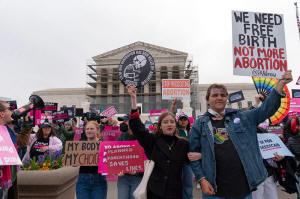Supreme Court appears divided over whether states can cut off Planned
Parenthood funding
[April 03, 2025]
By LINDSAY WHITEHURST
WASHINGTON (AP) — The Supreme Court appeared divided Wednesday in a case
over whether states should be able to cut off Medicaid funding to
Planned Parenthood, which comes amid a wider push from abortion
opponents to defund the nation’s largest abortion provider.
Low-income patients who go there for things like contraception, cancer
screenings and pregnancy testing could see their care upended if the
court sides with South Carolina leaders who say no public money should
go the organization.
The court is considering a legal question that could have wider effects:
Whether Medicaid patients can continue to sue over the right to choose
their own qualified provider.
South Carolina says those lawsuits aren't allowed and barring them would
save public money in legal fees. Some conservatives appeared open to
that argument. Justice Brett Kavanaugh said there has been confusion
over the question in lower courts. “One of my goals coming out of this
will be to provide that clarity,” Kavanaugh said.
The Trump administration weighed in to argue against the right to sue,
with attorney Kyle Hawkins saying the government had “re-evaluated its
position” after the election and come down on South Carolina's side.

The state says people could go through an administrative appeal process
if denied coverage, though justices like Amy Coney Barrett raised
questions about whether that would work for low-income patients. “That’s
the beneficiary taking the risk, going to the provider she wants to see,
and then potentially having to pay out of pocket, right?”
Planned Parenthood argues that Congress clearly wanted people to be able
to make their own “intensely personal” decisions about which doctor to
visit, and lawsuits are the only real way that right has been enforced.
Justice Elena Kagan agreed that patients do have the right to choose
their doctor under the law, and suggested that blocking them from suing
would be a sea change. “This is kind of changing the rules midstream,
isn’t it?” Kagan said.
People on both sides of the issue gathered outside the court for
demonstrations that included a brass band before arguments unfolded.
[to top of second column]
|

Abortion-rights activists and anti-abortion demonstrators rally
outside the Supreme Court in Washington, Wednesday, April 2, 2025.
(AP Photo/Jose Luis Magana)

The case started in 2018, before the court's decision that
overturned the nationwide right to abortion. South Carolina has
since banned it after around six weeks’ gestation.
South Carolina's move to cut off Medicaid funding was blocked in
court following a lawsuit from Medicaid patient Julie Edwards, who
wanted to keep going to Planned Parenthood for the birth control she
needed because her diabetes could make it dangerous for her to carry
a pregnancy to term, according to court papers. The state eventually
appealed to the Supreme Court.
Federal law prohibits Medicaid money from being used for abortions,
with very limited exceptions, but patients often go there for other
services because it can be tough to find doctors who accept the
publicly funded insurance program and can schedule appointments
quickly.
Other conservative states have also moved to cut Planned Parenthood
out of the Medicaid program, and more would likely follow if South
Carolina prevails. Attorneys for the state say patients can visit
other health centers for care.
About one-quarter of everyone in the U.S. is enrolled in the
program, and the American Cancer Society has said that losing the
ability to sue would hurt their access to care, especially in rural
areas.
In South Carolina, $90,000 in Medicaid funding goes to Planned
Parenthood every year — a tiny fraction of a percentage point of the
state’s total Medicaid spending.
All contents © copyright 2025 Associated Press. All rights reserved
 |